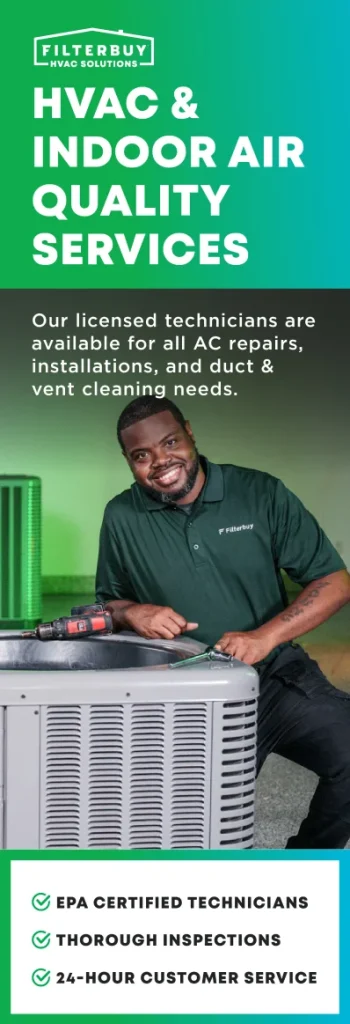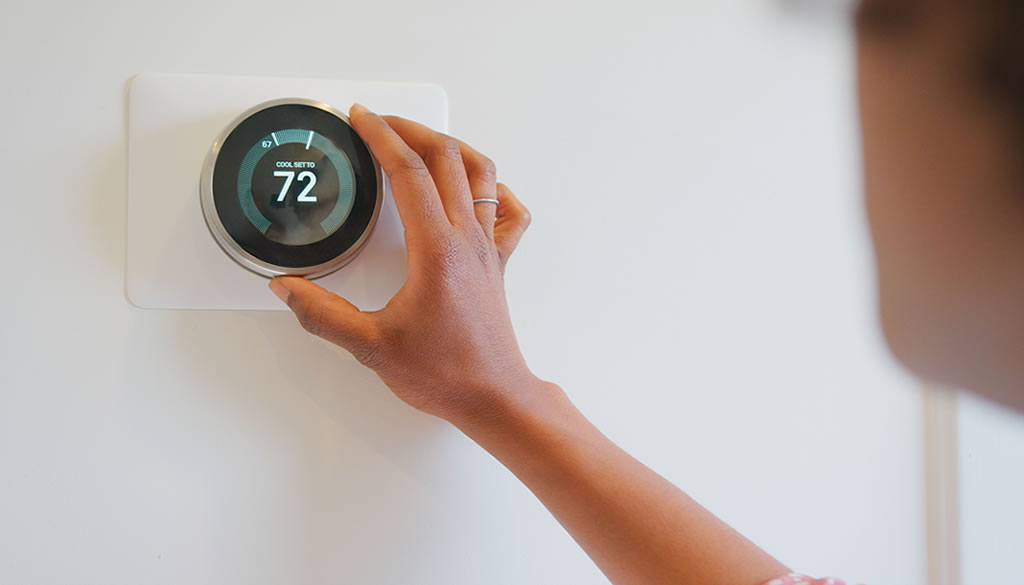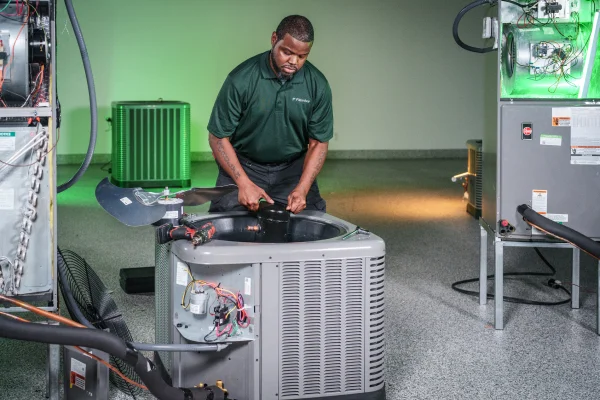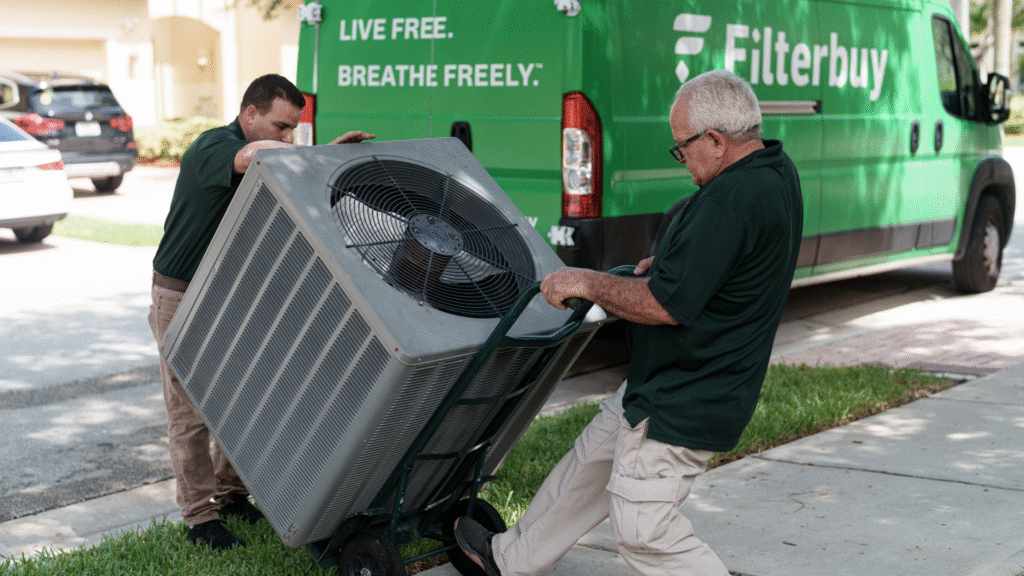An air-conditioning system rarely fails without sending a few early warnings. Catching those signals right away keeps summer bills down, prevents major part failures, and—most important—keeps your home comfortable when outside temperatures are high. This guide explains what normal operation looks like, the red-flag symptoms that call for fast service, and the quick checks you can do before calling a technician.
Key Takeaways
- New noises (grinding, screeching, banging) usually point to loose or failing parts.
- Weak airflow, warm air, or high indoor humidity often means low refrigerant or a frozen coil.
- A sudden spike in your electric bill suggests the AC is running longer to reach the set temperature.
- Musty or chemical odors can signal mold in the drain pan or a refrigerant leak.
- Water around the indoor unit shows a clogged condensate line or thawing ice—turn the system off and schedule service.
Understanding Your AC’s Normal Operation
A healthy system starts with a quiet click at the thermostat. The indoor blower and outdoor fan then hum at a steady tone while cool air flows evenly from every vent. Once the room reaches the set temperature, the unit shuts off and rests before the next cycle. Any big change in sound, airflow, or run time is a red flag.
Recognizing Unusual AC Noises
- Screeching: Worn fan or blower motor bearings.
- Grinding: Motor shaft or compressor failure.
- Banging / Clanking: Loose blade or broken part inside the compressor housing.
- Buzzing: Electrical short or failing capacitor.
Turn the system off if you hear any of these sounds to prevent further damage.
Assessing Ineffective Cooling Performance
- Warm air or hot spots often come from low refrigerant, a stuck reversing valve (heat pumps), or dirty coils.
- High humidity indoors can indicate a malfunctioning dehumidification cycle.
- Uneven temperatures between rooms may point to leaky ducts or blocked vents.
Evaluating Excessive Energy Usage
If your utility bill jumps even though the weather hasn’t changed, the AC is likely running longer to make up for a malfunction—often clogged coils, restricted airflow, or thermostat faults.
U.S. Department of Energy notes that neglected air conditioners lose efficiency and cost more to operate.
Identifying Unpleasant Odors
- Musty smell: Mold on the evaporator coil or in the drain pan can trigger allergies.
- Sweet or chemical odor: Possible refrigerant leak. Ventilate the space and call a technician.
- Burning dust: This is quite normal for the first few minutes of the season. If it persists, shut off the unit.
Why Fast Repairs Matter
Running an AC with low refrigerant or poor airflow overheats the compressor, which is one of the most expensive parts to replace. Quick service protects your budget and keeps the house comfortable during the hottest weeks of the year.
Basic Checks Before You Call
- Change the filter if it’s older than 30–60 days.
- Verify thermostat settings (set to “Cool,” temperature below room reading).
- Clear debris from the outdoor coil. Gently hose off dust and keep shrubs two feet away.
If the problem remains, switch the thermostat to “Off” and schedule professional service.
Filterbuy HVAC Solutions—Repair You Can Trust
- Virtual consultations & free quotes: Get pricing fast with a quick video call.
- Interest-free financing: Spread out the cost of major repairs or a new unit.
- Flexible appointments: Early-morning, evening, and weekend slots.
- Licensed technicians: On-time arrivals, work done to code, no surprise fees.
- 24-hour customer service: Call (833) 338-7420 any time.
From clogged drain lines to failed blower motors, Filterbuy’s team finds the problem, gives you a fixed quote, and gets your AC running again—fast.
Prevent Breakdowns with Simple Habits
- Replace the filter on schedule. Filterbuy pleated filters (MERV 8, 11, 13) trap dust without choking airflow and ship free to your door.
- Keep the outdoor coil clear of leaves and grass clippings.
- Book professional maintenance once a year for coil cleaning and refrigerant checks.
Schedule A Repair Now!
Strange sounds, weak airflow, high bills, or leaks all signal that your AC needs prompt repair. Turn the unit off, run through the quick checks above, and call Filterbuy HVAC Solutions to fix the problem before it turns into a costly breakdown.
Frequently Asked Questions
How long does an AC unit last?
Most AC units last about 15 to 20 years if regularly maintained. Seasonal checkups help catch small issues early and prolong the unit’s lifespan.
What should I check first if my AC stops working?
Start with the basics: check the thermostat settings, ensure the circuit breaker hasn’t tripped, and look for a dirty or clogged filter. If none of these is the problem, the issue might be more serious.
How do I know if my HVAC system is failing?
Common signs include unusual noises, inconsistent temperatures, or rising energy bills. If your unit is over 10 years old and needs frequent repairs, it may be time for replacement.
What is the most common AC repair?
Typical repairs include refrigerant leaks, sensor issues, drainage problems, and electrical failures. These can lead to poor performance, sudden breakdowns, or higher electricity usage.
Which AC brands last the longest?
Top-rated brands might cost more initially, but they offer easy installation, strong warranties, and excellent durability, making them cost-effective in the long run.
When should I replace my AC unit?
Consider replacing your AC if it frequently needs repairs, causes high energy bills, or provides uneven cooling. Frequent on-and-off cycling also indicates inefficiency.
How long does an AC compressor typically last?
An AC compressor usually lasts 10 to 15 years with good maintenance. Regular cleaning, proper refrigerant levels, and regular checks can extend its lifespan.
Is running my AC constantly bad?
Yes, running an AC unit constantly can lead to higher energy use, increased costs, and greater environmental impact.
Is leaving my AC on all day harmful?
Continuous use reduces efficiency, increases electricity bills, and can prematurely wear out your system, shortening its lifespan.
How much does an AC system cost?
Although initial costs are high, investing in quality equipment can save money over time by reducing future repairs and lowering energy expenses. Consider these savings when planning a replacement.
How long is too long for an AC to run continuously?
Running your AC nonstop reduces efficiency, increases energy costs, and can cause system failures. AC units perform best with regular breaks, helping maintain peak efficiency.
How long does an AC refrigerant last?
Properly maintained AC systems generally last about 15 years. Over time, refrigerant becomes less effective, decreasing cooling performance and overall system efficiency.







